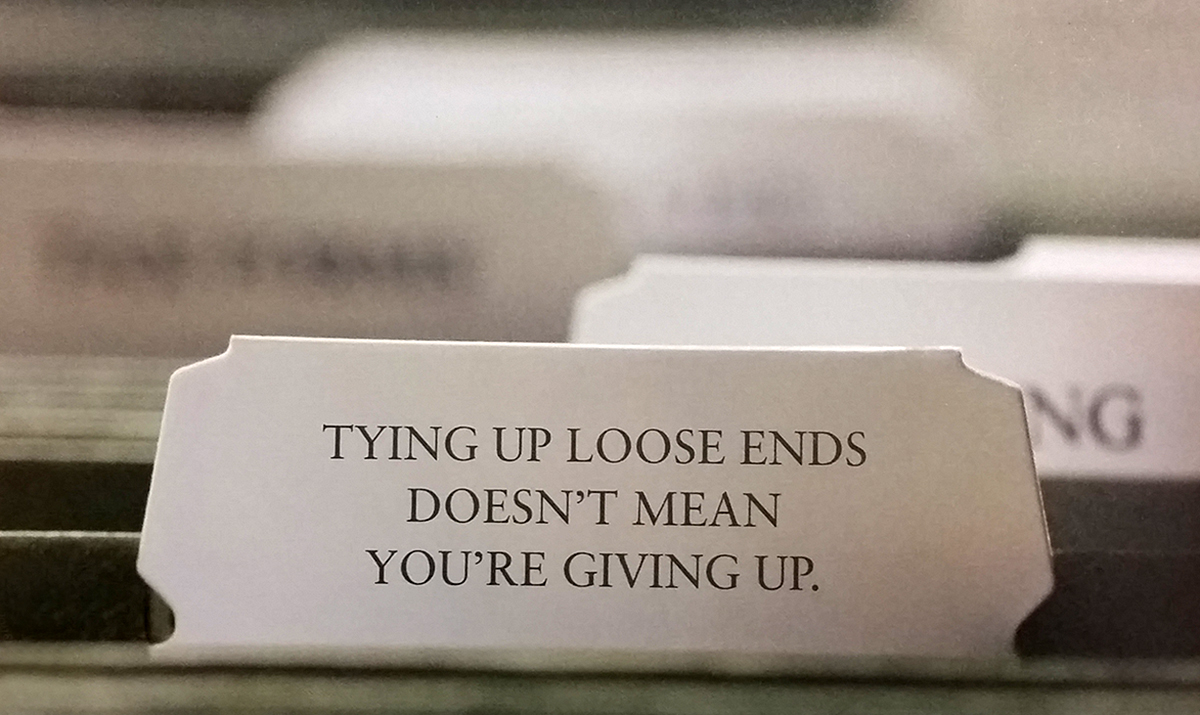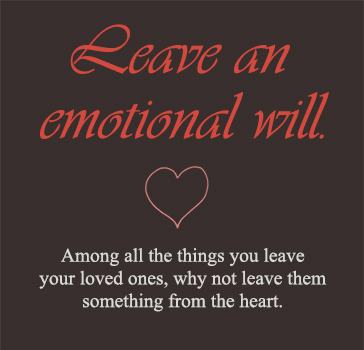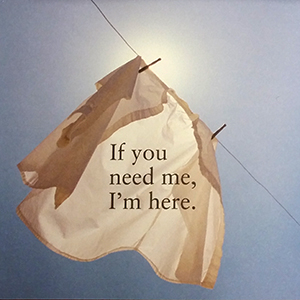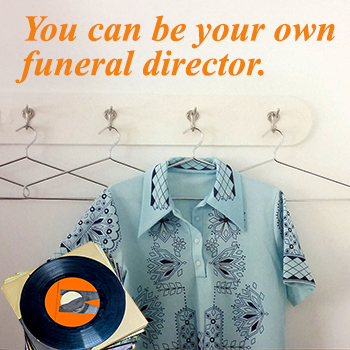 By
Linda McSweeny
By
Linda McSweeny

Muppets creator Jim Henson reportedly specified that nobody should wear black at his funeral and requested jazz tunes. Big Bird sang at his public memorial and mourners heard his advice, made well before his 1990 sudden death, to “watch out for each other…love and forgive everybody…”. Many of us don’t want such fanfare in death but we, too, can let people know our wishes before we pass.
Henson’s letter to his children to read in the event of his death is full of comforting words. Prose aside, there’s a lot we can do to make life easier for the people around us as we contemplate dying: make a will, organise our financial affairs, put in place a written directive for our medical care towards the end of life, appoint a substitute guardian, and plan our funeral.
 We can also make emotional wills – personal notes that pass on family recipes, special or quirky memories, heart-warming secrets and desires. These can be in the form of letters, drawings or recordings, however we also need to consider binding, legal documents such as wills and advance care plans.
We can also make emotional wills – personal notes that pass on family recipes, special or quirky memories, heart-warming secrets and desires. These can be in the form of letters, drawings or recordings, however we also need to consider binding, legal documents such as wills and advance care plans.
The practical side of the end-of-life can be daunting but there’s a simple way to start – spend time gathering personal documents and thoughts and share them with close family or friends.
Gather important documents
“Everyone’s different in what their focus will be,” says Sarah Penman, Cancer Council NSW’s Legal and Financial Support Services Manager.
“Practically, getting all your important documents together and telling someone where they are, can be really, really helpful. A lot of what you’re doing when you’re talking about the idea of ‘getting your affairs in order’ is pulling things together to make it easier for your loved ones when you do pass away.”
Make a will
People often dismiss the idea of making a will, perhaps fearing it means death is nigh or because they think they don’t own anything valuable enough to pass on to others. Usually, there’s a superannuation account floating around or trinkets that family may cherish, regardless of monetary measures of worth.
“Everyone really should have a will,” says Penman.
“A will isn’t something that should only be for somebody who has some kind of advanced illness or who is of a certain age – it’s for anyone who is over 18, particularly if they have a family.”
Penman likens the process to such practical aspects of life as sorting through documents at tax time: “It’s like keeping all your tax stuff together throughout the year or having all your financial stuff filed in one drawer or whatever it is – it’s a practical step”.
You may also want to include instructions for your digital life. Most of us have email and social media accounts with photos and often private content that we may or may not want as an ongoing memorial. Facebook, Gmail, Twitter and all of the social media platforms have policies around what can be accessed after someone has died and information on how accounts can be closed down.
Advance care planning
It can be a good idea to think about your wishes for your future medical care, and to discuss these with your family, friends and health care team. This process is called advance care planning, and it can be started at any stage, whether you are healthy or ill. It means talking about specific medical situations that might arise during treatment and care. For instance, do you want to be resuscitated at a certain point or would you rather no further medical intervention?
You can write down your wishes in what is known as an advance care plan or advance care directive. Although this may not be legally binding, it does provide a record for doctors, family and carers to consider.
“An advance care plan – or an advance health directive – is a detailed document that goes into the nuts and bolts of your care – if you need a machine that will breathe for you, do you want that or not? What type of life-prolonging treatment do you want or not want?” says Penman.
“It’s very detailed and is a document that really needs to be completed with the medical team.”
Appointing substitute decision-makers
You can appoint a person to make decisions on your behalf if you’re incapable of doing so, such as if you are unable to talk or articulate your wishes. Each state and territory has different ways of handling the documents for appointing this substitute decision-maker. The documents may may be known as an enduring power of attorney, enduring power of guardianship, or appointment of an enduring guardian.
“If you appoint someone to make decisions about your medical treatment and lifestyle decisions, what you’re effectively doing is saying when you lose capacity to make decisions for yourself, you appoint this person to make all of those decisions on your behalf,” says Penman.
Planning your funeral
Yes, you can do it before you die and have a say in how events will transpire after your passing. It’s not for everyone but it’s also not morbid – sharing your hopes can help those people entrusted to carry out your wishes when the time comes.
You can choose your funeral venue, the music, food, who you’d like to talk about your life and what you want to wear in death. You can also stipulate whether or not you wish be buried in accordance with your cultural wishes and values.
Do I need to see a lawyer?
Seeking legal advice is advisable but not essential: some people decide to pursue their legal affairs on their own and that’s a personal decision. Engaging a lawyer can help relieve pressure when you need help making a will, appointing a substitute decision-maker and generally organising your financial affairs.
Assistance is available for people who cannot afford the legal expertise they need. If you have questions about this, Cancer Council 13 11 20 Information and Support can help.
“It’s great to share your wishes with your family, I think that’s a great first step,” says Penman. “But then it can be about getting those down on paper and getting those legally set out…sometimes it can be that seeing a lawyer means that you can resolve it all at once.”
“There are ways of doing it yourself but it can be a bit more of a runaround, which can be tricky, but it just depends on a person’s ability to pay for advice and their personal situation.”
Finding support
As end-of-life approaches, it’s crucial to remember that while practical and legal arrangements are important, you and your carers may need emotional support. There are ample support services for patients and carers as they face advanced cancer and the challenges it brings – from phone and online support to face-to-face counselling and pastoral care.
 Cancer Council NSW offer a professional counselling service as well as telephone and face-to-face support groups for both patients and carers. Support groups connect patients and carers with each other to share experiences and advice. Cancer patient and telephone support group member Mike Mulchrone says the conversations are thought-provoking and “make you think how other people are getting on… you’re not alone.”
Cancer Council NSW offer a professional counselling service as well as telephone and face-to-face support groups for both patients and carers. Support groups connect patients and carers with each other to share experiences and advice. Cancer patient and telephone support group member Mike Mulchrone says the conversations are thought-provoking and “make you think how other people are getting on… you’re not alone.”
Help at home
As the Beatles song lyrically tells us, we can “get by with a little help from our friends”.
When cancer makes everyday living tricky, there is help at hand. This can be especially valuable if cancer treatment causes fatigue or other side effects.
There are networks of services across New South Wales that provide help with everyday tasks such as housework, local transport and shopping. To find out if an appropriate service operates in your area please call Cancer Council 13 11 20 Information and Support.
More information
Cancer Council NSW offer a range of support services for cancer patients and their carers and families, including counselling, telephone and face-to-face support groups:
Find support services for cancer patients.
Find support services for carers, friends and family.
Find out about legal and financial assistance.
Find more information about advanced cancer and palliative care.
Call Cancer Council 13 11 20 Information and Support to speak to a specialist cancer professional.
We would like to thank PilotLight Australia and The GroundSwell Project for allowing us to use illustrations from the book “Dying to know – Bringing death to life”. The book is available from The GroundSwell Project.
